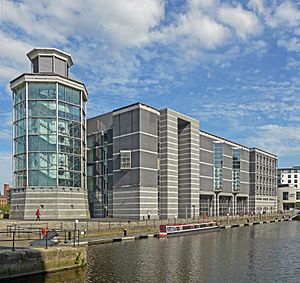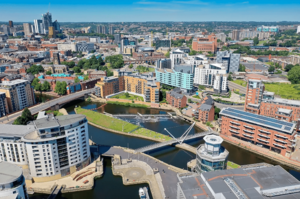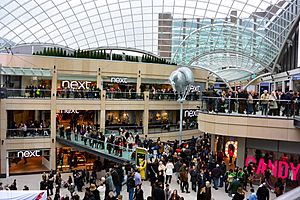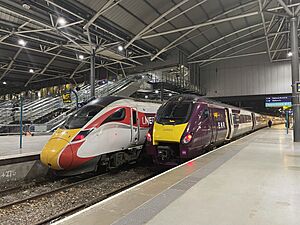Economy of Leeds facts for kids
The economy of Leeds is super important to the United Kingdom! It's one of the most varied economies among all major UK cities. This means Leeds has many different types of jobs and businesses, not just one or two. In fact, Leeds has seen the fastest growth in private-sector jobs compared to any other UK city.
Leeds is a huge hub for legal and financial services, second only to London in England. It's also the third largest in the UK overall, after Edinburgh. In 2011, its financial and insurance industries were worth a massive £2.1 billion! More than 30 national and international banks have offices here.
The city is also the UK's third largest manufacturing centre. About 1,800 companies and 39,000 people work in manufacturing in Leeds. These businesses make up nearly 9% of all jobs in the city. They produce things like engineering parts, books, food, drinks, chemicals, and medical equipment. Experts even call Leeds a "gamma world city," which means it's an important global city. Over the next ten years, Leeds' economy is expected to grow by 25%. Financial and business services will lead this growth, making up over half of the new value created.
Leeds' growth has changed how the UK's economy is spread out. It's now one of the biggest financial centres outside London. New industries like retail, call centres, offices, and media have helped the economy grow a lot since the early 1990s. Leeds was the first British city to get full broadband and digital coverage early on. This helped it become a key place for new media companies. Today, over 33% of the UK's internet traffic goes through Leeds, making it a very important internet hub.
Contents
- What Makes Leeds a Good Place?
- Leeds' Economic Output (GVA)
- Jobs and Learning in Leeds
- Big Companies in Leeds
- Making Things in Leeds (Manufacturing)
- Money and Business Services
- Shopping in Leeds (Retail)
- Visiting Leeds (Tourism)
- Getting Around Leeds (Infrastructure)
- New Buildings and Growth (Development)
What Makes Leeds a Good Place?
People often look at different things to see how well a city is doing. These are called economic indices. They help us understand things like quality of life and how good a city is for business.
Quality of Life in Leeds
- In 2013, Leeds was ranked 5th in the UK for quality of life among 12 large cities. This ranking looked at things like house prices, rent, salaries, and how happy people were.
- However, in 2010, Leeds was also ranked 4th in England for income and employment challenges.
- It was ranked 15th among big cities in the UK for being "cycle-friendly" in 2010.
Leeds for Business
A survey in 2010 asked 500 European businesses about the best cities for business. Here's how Leeds ranked:
- Overall, Leeds was 23rd in Europe and 4th in the UK (after London, Manchester, and Birmingham) as a good place to start a business.
- It was ranked 1st in Europe and the UK for how much value you get for your money when renting office space.
- Leeds was also 1st in the UK (tied with Glasgow) for staff costs, meaning it's more affordable to hire people here.
- It was 3rd in the UK (after Manchester and Birmingham) for how much office space was available.
Leeds' Economic Output (GVA)
Gross value added (GVA) is a way to measure the value of goods and services produced in an area. In 2012, Leeds' GVA was £18.8 billion. This made up 1.4% of the UK's total GVA. It also accounted for 44% of the GVA in West Yorkshire and 20% in the wider Yorkshire and Humber region. Leeds is the biggest economic centre in its region, much larger than Sheffield or Bradford.
Compared to other big UK cities, only London, Greater Manchester South, and Birmingham had a higher GVA than Leeds in 2012.
| Sector | Value (£ millions) |
Growth 2010-11 (%) |
% of total |
|---|---|---|---|
| Agriculture, forestry and fishing | 41 | 0.2 | |
| Production | 2,217 | 11.8 | |
| - of which manufacturing | 1,532 | 8.1 | |
| Construction | 1,065 | 5.7 | |
| Distribution; transport; accommodation and food | 3,028 | 16.1 | |
| Information and communication | 1,221 | 6.5 | |
| Financial and insurance services | 2,094 | 11.1 | |
| Real estate activities | 2,421 | 12.9 | |
| Business service activities | 2,570 | 13.6 | |
| Public administration, education and health | 3,555 | 18.9 | |
| Other services and household activities | 627 | 3.3 | |
| Total | 18,838 |
Jobs and Learning in Leeds
In 2012, Leeds had about 757,700 people living there. The number of people living in Leeds grew by almost 1% between 2011 and 2012.
Employment in Leeds
In 2013, about 68.8% of people aged 16-64 in Leeds were employed. This was slightly lower than the average for Great Britain (71.1%). The unemployment rate in Leeds was 9.6%, which was a bit higher than the Great Britain average of 7.8%.
Education in Leeds
Education is very important for a city's economy. In 2012, 84.1% of students in Leeds achieved 5 or more GCSEs at grades A*-C. This was higher than the England average of 81.8%. However, when including English and Maths, the percentage was 55.0%, slightly below the England average of 59.4%.
Many people in Leeds have good qualifications. In 2012, 35.1% of people in Leeds had an NVQ4 or higher (which is like a university degree). This was higher than the average for Yorkshire and The Humber and similar to the Great Britain average. Only 10.2% of people in Leeds had no qualifications, which is lower than the regional average.
Big Companies in Leeds
Many well-known companies have their main offices in Leeds.
- Asda, a big supermarket chain, has its head office in Leeds.
- Jet2.com, an airline, is based near Leeds Bradford Airport.
- GHD, known for hair styling products, has its headquarters in Leeds.
- Other companies based here include First Direct (a bank), Republic (a clothing store), Premier Farnell (electronics), Ginetta Cars (sports cars), Leeds Building Society, and Yorkshire Bank.
Making Things in Leeds (Manufacturing)
Leeds has almost 1,800 manufacturing companies. They make a wide range of products, from special engineering parts to food, drinks, chemicals, and medical technology. This sector employs over 144,200 people and creates more than £15 billion for Leeds each year. Most of these companies are small to medium-sized, but big names like Siemens and Mitsubishi also have a presence.
Vehicle Production
- Optare buses used to be made in Cross Gates, Leeds, before moving to a new factory nearby.
- Ginetta sports cars are made in Garforth, Leeds.
Food Production
Food production is a big part of Leeds' manufacturing.
- Arla Foods UK (dairy products) and Northern Foods are based in Leeds.
- Goldenfry (food products) is in Wetherby, near Leeds.
- Brewing beer has a long history in Leeds. While the famous Tetley's Brewery closed, Leeds Brewery and the reopened Kirkstall Brewery still make beer in the city.
- Unilever also makes various goods at its factory in Leeds.
Chemicals
Leeds still has several chemical companies, including E Chem, Clariant, and Chemsol.
Money and Business Services
Leeds is one of the biggest business centres in the UK. About a quarter of a million people work in financial and professional services in the wider Leeds City Region. This industry is worth £13 billion each year!
These services are mostly found in the city centre's traditional business area and a newer area along the River Aire. Many smaller legal and professional firms are in older Georgian buildings, while banks and insurance companies are around Park Row.
Unlike many other northern cities, Leeds had a mix of different industries for a long time. This meant it didn't suffer as much when older industries declined. In the 2000s, the service sector grew a lot, with many legal, accounting, banking, and insurance firms moving to the city.
Big companies with offices in Leeds include KPMG, Norwich Union, First Direct, Lloyds Banking Group, HSBC, Leeds Building Society, Yorkshire Bank, and Zurich Financial Services. The Bank of England even has its second office in Leeds, outside of London. Both the University of Leeds and Leeds Metropolitan University have business schools, which are supported by the city's businesses.
Shopping in Leeds (Retail)
Leeds is the 3rd largest shopping destination in the UK, after London. It's a major shopping hub in Europe! You can find everything from unique small shops to large department stores like Harvey Nichols and Louis Vuitton.
The Victoria Quarter is a famous shopping area with beautiful stained-glass roofs. In 2016, a new shopping centre called Victoria Gate opened, bringing a big John Lewis store and many luxury brands to the city.
Leeds also has many stunning Victorian arcades, like Thornton's Arcade and Queens Arcade, each with its own charm. Other popular shopping spots include Leeds Kirkgate Market (where the first Marks & Spencer started!), Trinity Leeds, and the White Rose Centre.
Visiting Leeds (Tourism)

Leeds is a popular place for tourists!
- In 2017, Lonely Planet named Leeds a Top 10 European Destination.
- Condé Nast Traveler readers ranked Leeds 6th among the best UK cities for visitors in 2017.
- Earlier, it was voted the "UK's favourite city" in 2004 and "best English city to visit outside London" in 2005.
Leeds is easy to get to because it's close to the centre of the UK. Major motorways like the M1 and M62 connect it to London, Manchester, and other cities. Leeds Bradford Airport is growing fast, with flights to over 70 European destinations.
Tourism in Leeds supports over 20,000 jobs. Each year, about 1.5 million people stay overnight in Leeds, and another 10 million visit for day trips. Visitors bring nearly £735 million into the local economy every year.
Popular attractions include the Royal Armouries Museum, Leeds Art Gallery, and the Henry Moore Institute. Leeds is also the only city outside London to have its own opera and ballet companies: Opera North and Northern Ballet Theatre.
By 2016, Leeds had 27.29 million tourist visits, bringing in over £1.6 billion for the city. This shows how much tourism helps the local economy!
Getting Around Leeds (Infrastructure)
Leeds is well-connected by roads, including the M1, M62, and A1(M) motorways. Leeds railway station is one of the busiest train stations in the North of England, with 31 million passengers each year. It has train links to London, Birmingham, Manchester, Glasgow, Edinburgh, and other major cities. There are plans to improve public transport in Leeds, making it easier to get around without a car.
Buses are the main type of public transport in Leeds. Leeds City bus station offers both long-distance and local bus services. Leeds Bradford Airport connects the city to most major European cities, as well as Heathrow and Amsterdam.
In 2016, Leeds approved a plan to heat 2,000 homes using extra heat from a local energy recycling plant. This is a great way to use energy efficiently!
New Buildings and Growth (Development)
Leeds has seen a lot of new building work, especially in the city centre. There are new homes for students and a big project to redevelop the area south of the River Aire, known as Leeds South Bank. This project is one of the largest city centre redevelopments in Europe! It will double the size of Leeds City Centre and create 8,000 new homes and over 35,000 jobs by 2028.
Many new tall buildings are being built or planned in Leeds. Sixteen skyscrapers are currently under construction or proposed, all taller than the old tallest building, West Riding House. Bridgewater Place, sometimes called 'The Dalek', is currently the tallest building in Leeds and Yorkshire.
The Leeds City Region Enterprise Zone was started in 2012 to encourage new developments in four areas along the A63 road.
 | Charles R. Drew |
 | Benjamin Banneker |
 | Jane C. Wright |
 | Roger Arliner Young |




